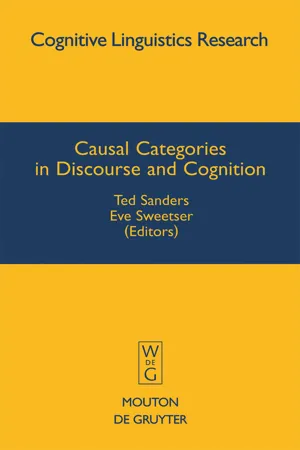
Causal Categories in Discourse and Cognition
- 259 pages
- English
- PDF
- Available on iOS & Android
Causal Categories in Discourse and Cognition
About this book
All languages of the world provide their speakers with linguistic means to express causal relations in discourse. Causal connectives and causative auxiliaries are among the salient markers of causal construals. Cognitive scientists and linguists are interested in how much of this causal modeling is specific to a given culture and language, and how much is characteristic of general human cognition. Speakers of English, for example, can choose between because and since or between therefore and so. How different are these from the choices made by Dutch speakers, who speak a closely related language, but (unlike English speakers) have a dedicated marker for non-volitional causality (daardoor)?
The central question in this volume is: What parameters of categorization shape the use of causal connectives and auxiliary verbs across languages? The book discusses how differences between even quite closely related languages (English, Dutch, Polish) can help us to elaborate the typology of levels and categories of causation represented in language. In addition, the volume demonstrates convergence of linguistic, corpus-linguistic and psycholinguistic methodologies in determining cognitive categories of causality. The basic notion of causality appears to be an ideal linguistic phenomenon to provide an overview of methods and, perhaps more importantly, invoke a discussion on the most adequate methodological approaches to study fundamental issues in language and cognition.
Frequently asked questions
- Essential is ideal for learners and professionals who enjoy exploring a wide range of subjects. Access the Essential Library with 800,000+ trusted titles and best-sellers across business, personal growth, and the humanities. Includes unlimited reading time and Standard Read Aloud voice.
- Complete: Perfect for advanced learners and researchers needing full, unrestricted access. Unlock 1.4M+ books across hundreds of subjects, including academic and specialized titles. The Complete Plan also includes advanced features like Premium Read Aloud and Research Assistant.
Please note we cannot support devices running on iOS 13 and Android 7 or earlier. Learn more about using the app.
Information
Table of contents
- Frontmatter
- Table of contents
- Introduction: Causality in language and cognition – what causal connectives and causal verbs reveal about the way we think
- Causality, cognition and communication: A mental space analysis of subjectivity in causal connectives
- Causal Connectives in Dutch Biblical Translations A cognitive linguistic approach
- Causes and consequences: Evidence from Polish, English, and Dutch
- Categories of subjectivity in Dutch causal connectives: a usage-based analysis
- Causes for causatives: the case of Dutch doen and laten
- Causal categories in discourse – Converging evidence from language use
- Backmatter